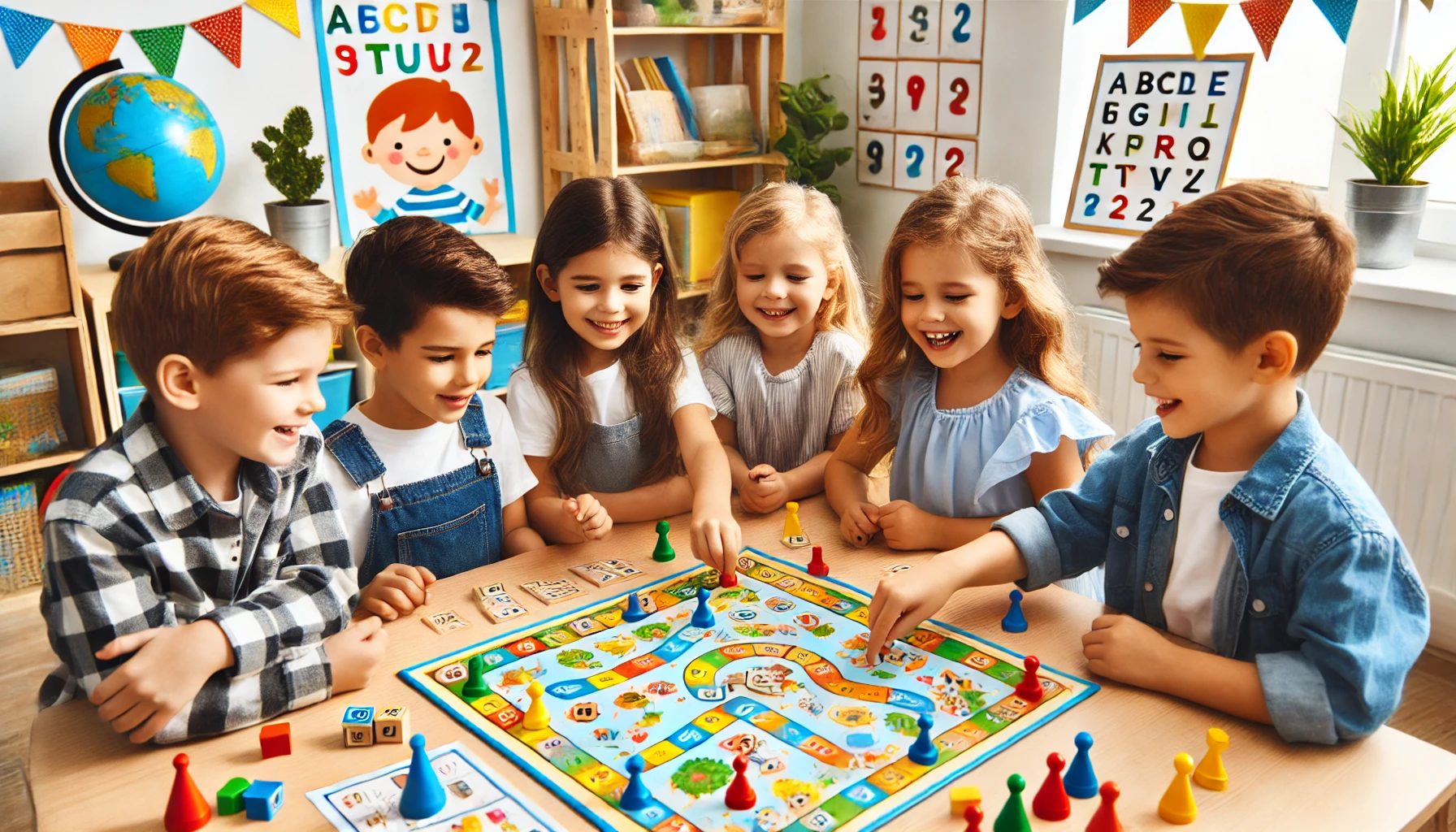Best 20 Educational Games for Kids
Studies has shown that academic study can be very boring but when the same study is taught in a fun and interesting way it is well understood by the kids. Finding engaging and educational games for kids is essential to ensure they develop cognitive skills, creativity, and problem-solving abilities while having fun. Whether you’re looking for an activity for preschool, crafts for kids, or science experiments for kids, these games will help your child learn in an interactive way.
1. Chess – The Gymnasium of brain
Originated from India chess is a two-player strategy game played on an 8×8 board with 32 pieces. It enhances strategic thinking, concentration, and problem-solving skills.
- Improves memory and logical reasoning.
- Enhances decision-making and patience.
- Develops pattern recognition and planning skills.
- Encourages critical thinking and concentration.
How to Play: - Chess is a two-player strategy game played on an 8×8 board with 32 pieces.
- Each player starts with 16 pieces: one king, one queen, two rooks, two knights, two bishops, and eight pawns.
- The goal is to checkmate the opponent’s king by placing it under an inescapable threat.
- Players take turns moving pieces according to their respective rules.
To learn chess like an expert Kingdom of Chess offers a great platform to help children master the game in a fun and interactive way.
2. Scrabble – Expanding Vocabulary
Scrabble is a word game that strengthens vocabulary and spelling skills. Kids learn to form words using letter tiles, improving their language comprehension.
- Boosts spelling, vocabulary, and literacy.
- Encourages strategic thinking in word formation.
- Improves cognitive flexibility and problem-solving.
- Strengthens verbal communication skills.
How to Play: - Players draw letter tiles and use them to form words on the board.
- Words must connect to existing words, like a crossword puzzle.
- Each letter has a point value, and players score based on word difficulty.
3. Sudoku – Enhancing Logical Thinking
One of the best educational Games for Kids Sudoku is a number-based puzzle game that helps kids develop concentration and patience.
- Improves logical reasoning and problem-solving.
- Encourages critical thinking and analytical skills.
- Boosts memory and attention span.
- Builds perseverance and patience.
How to Play: - Sudoku is a number puzzle played on a 9×9 grid.
- The goal is to fill the grid so that each row, column, and 3×3 section contains digits 1-9 without repetition.
4. Science Experiments for Kids – Learning Through Exploration
Hands-on science experiments for kids make learning exciting and help explain complex concepts.
- Encourages curiosity and hands-on discovery.
- Develops observational and analytical skills.
- Strengthens problem-solving abilities.
- Fosters an early interest in STEM subjects.
How to Play: - Simple experiments like making a baking soda volcano involve mixing baking soda and vinegar to create an eruption.
- There are many more such science experiments that are present on YouTube which can be experimented at home.
5. Arts and Crafts for Kids – Enhancing Creativity
Engaging in arts and crafts for kids helps in fine motor skill development.
- Encourages creative expression.
- Improves hand-eye coordination and patience.
- Builds problem-solving skills.
- Strengthens attention to detail.
How to Play:
Use materials like paper, glue, and colors to create DIY crafts.
Crafts are mainly created with the waste at home like as simple as the pistachio shell we have at our home can be turned into a beautiful frame
6. Lego and Building Blocks – Learning Engineering Concepts
Lego Building blocks are widely used in the whole world it introduces kids to engineering principles which makes them sharper and also keep them engaged
- Develops spatial awareness and fine motor skills.
- Encourages problem-solving and critical thinking.
- Boosts creativity and imagination.
- Strengthens patience and perseverance.
How to Play:
You can purchase Lego from Home | Official LEGO® IN or from amazon, there are many verities and types of Legos available, and kids can construct various structures using interlocking blocks.
7. Memory Games – Strengthening Recall Skills
Many Memory games are widely played all across the world like matching pairs or Simon Says improve concentration. They help in many ways –
- Enhances cognitive function and recall ability.
- Builds attention span and observational skills.
- Develops patience and strategic thinking.
- Strengthens early learning and memory retention.
8. Jigsaw Puzzles – Building Problem-Solving Skills
Everyone in their childhood has played Jigsaw puzzles which improve spatial reasoning and logic.
- Enhances patience and problem-solving abilities.
- Strengthens hand-eye coordination.
- Encourages resilience and persistence.
- Develops critical thinking and focus.
9. Monopoly – Teaching Financial Literacy
In terms of finance monopoly can be considered as a good Educational Games for Kids One of the most popular game Monopoly introduces financial literacy in a fun way.
- Teaches money management and budgeting.
- Encourages decision-making and strategy.
- Builds negotiation and math skills.
- Strengthens risk assessment and planning.
10. Coding Games – Preparing for the Digital Age
Currently Coding is the most demanded skill so why not teach it from early childhood there are many kids friendly version of coding is available coding games like Scratch or Code.org introduce children to programming.
- Develops logical thinking and problem-solving.
- Strengthens creativity and attention to detail.
- Encourages persistence and structured thinking.
- Builds confidence in technology use.
11. Math Bingo – Making Math Fun
A game that strengthens basic math skills.
- Encourages quick thinking and problem-solving.
- Improves number recognition and calculations.
- Builds confidence in math concepts.
12. Storytelling Dice – Enhancing Creativity
Storytelling dice help children develop storytelling skills.
- Encourages imaginative thinking.
- Improves verbal communication.
- Strengthens sequencing and comprehension.
13. Crossword Puzzles – Expanding Word Knowledge
Crosswords improve vocabulary and critical thinking.
- Enhances spelling and word recognition.
- Encourages problem-solving and patience.
- Builds general knowledge.
14. Tangrams – Developing Spatial Intelligence
Tangrams is an ancient Chinese puzzle game that involves arranging seven geometric pieces (tans) to form specific shapes. It is a great way to develop spatial awareness, problem-solving skills, and creativity.
- Improves visual-spatial awareness.
- Encourages creativity and logical thinking.
- Strengthens problem-solving skills.
How to Play: - Start with a Tangram Puzzle Outline – Players are given a silhouette of a shape (animals, people, objects, etc.).
- Rearrange the 7 Pieces – Use all pieces without overlapping to match the shape.
- Solve & Experiment – There can be multiple ways to complete a puzzle!
15. Origami – Combining Art and Math
The traditional Japanese art of paper folding to create intricate designs and figures without cutting or gluing. Origami enhances fine motor skills and patience.
- Develops precision and hand-eye coordination.
- Encourages focus and creativity.
- Introduces geometry concepts.
How to Play: - Fold paper into various designs.
Popular Origami Creations: - Crane (symbol of peace & longevity)
- Butterfly
- Frog
- Lotus Flower
- Paper Boat & Airplane
16. Hide and Seek – Developing Awareness
A classic game that helps kids develop spatial awareness.
- Improves problem-solving and strategy.
- Enhances observational skills.
- Strengthens agility and quick decision-making.
17. Musical Chairs – Teaching Social Skills
This game helps develop motor coordination and social skills.
- Encourages teamwork and fair play.
- Improves listening skills and reflexes.
- Strengthens reaction time and agility.
How to Play: - Walk around chairs while music plays; sit when it stops.
18. Rock, Paper, Scissors – Teaching Quick Decision-Making
A simple game that enhances strategic thinking.
- Develops quick decision-making.
- Encourages probability analysis.
- Teaches fairness and sportsmanship.
How to Play: - Both players count to three and simultaneously show one of three hand signs:
- ✊ Rock (a closed fist)
- ✋ Paper (an open hand)
- ✌️ Scissors (a fist with two fingers extended)
Winning Rules: - Rock beats Scissors (crushes them)
- Scissors beat Paper (cuts it)
- Paper beats Rock (covers it)
- If both players choose the same gesture, it’s a tie, and they play again.
19. Hopscotch – Building Motor Skills
A fun outdoor game that develops balance and coordination.
- Improves number recognition.
- Enhances motor skills and agility.
- Strengthens focus and planning.
How to Play Hopscotch: - Draw the Hopscotch Grid – Use chalk (outdoors) or tape (indoors) to create numbered squares.
- Throw a Small Object (stone, bean bag) onto a square.
- Hop on One Foot – Skip the square with the object and hop on others.
- Pick Up the Object – Balance while retrieving the object.
- Complete the Grid & Repeat – Continue until all numbers are covered.
20. Word Association Games – Expanding Verbal Skills
A word-based game that strengthens vocabulary.
- Enhances linguistic abilities.
- Encourages quick thinking.
- Builds creativity and memory recall.
How to Play: - Say a word related to the previous one.
Final Thoughts
Many educational games for kids provide a perfect balance between fun and learning. Whether it’s chess for strategic thinking, arts and crafts for creativity, or science experiments for curiosity, each game plays a role in a child’s overall development.
Start incorporating these educational games today and watch your child grow into a confident and creative learner!



